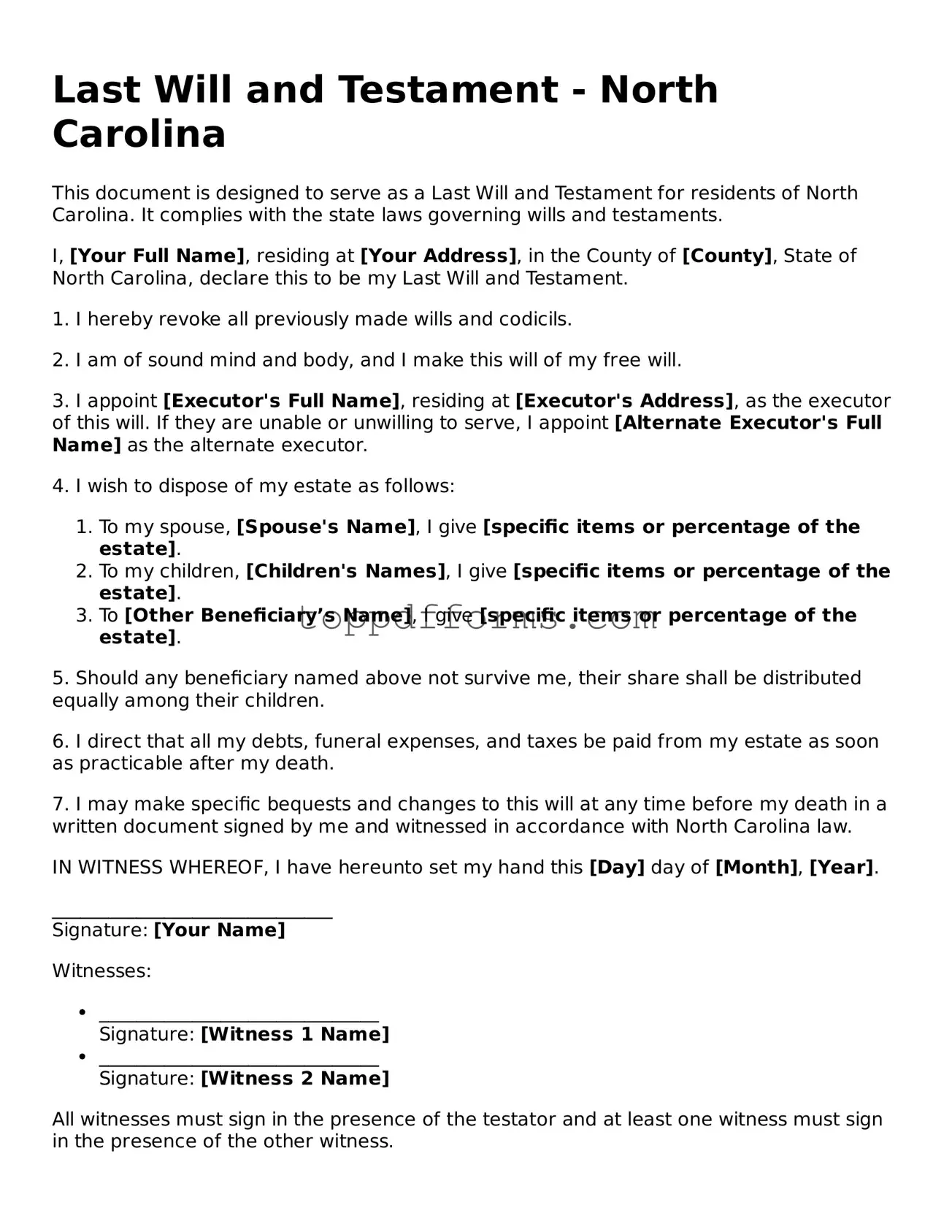Last Will and Testament Document for North Carolina State
Things You Should Know About This Form
What is a Last Will and Testament in North Carolina?
A Last Will and Testament is a legal document that outlines how a person's assets and property should be distributed after their death. In North Carolina, this document allows you to specify beneficiaries, appoint an executor to manage your estate, and make arrangements for guardianship of minor children, if applicable. It ensures that your wishes are honored and can help prevent disputes among family members after you pass away.
Do I need a lawyer to create a Last Will and Testament in North Carolina?
No, you do not need a lawyer to create a Last Will and Testament in North Carolina. While having legal assistance can be beneficial, especially for complex estates, many individuals choose to prepare their own wills using a template or form. It's essential, however, to ensure that the will complies with state laws to be valid. This includes signing the document in the presence of at least two witnesses who are not beneficiaries.
What happens if I die without a Last Will and Testament in North Carolina?
If you die without a Last Will and Testament, you are considered to have died "intestate." In this case, North Carolina's intestacy laws will determine how your assets are distributed. Typically, your estate will be divided among your closest relatives, such as your spouse, children, or parents. This may not align with your wishes, which is why having a will is crucial for ensuring your preferences are followed.
Can I change my Last Will and Testament after it is created?
Yes, you can change your Last Will and Testament at any time while you are still alive. To make changes, you can either create a new will or add a codicil, which is a document that modifies specific parts of your existing will. It’s important to follow the same signing and witnessing requirements as the original will to ensure the changes are legally valid. Regularly reviewing and updating your will helps reflect your current wishes and circumstances.
PDF Overview
| Fact Name | Description |
|---|---|
| Definition | A Last Will and Testament is a legal document that outlines how a person's assets will be distributed after their death. |
| Governing Law | The North Carolina Last Will and Testament is governed by Chapter 31 of the North Carolina General Statutes. |
| Age Requirement | In North Carolina, individuals must be at least 18 years old to create a valid will. |
| Signature Requirement | The will must be signed by the testator (the person making the will) in the presence of at least two witnesses. |
| Witnesses | Witnesses must be at least 18 years old and should not be beneficiaries of the will to avoid conflicts of interest. |
| Revocation | A will can be revoked by creating a new will or by physically destroying the original document. |
| Probate Process | After death, the will must go through probate, a legal process that validates the will and oversees the distribution of assets. |
Common mistakes
Filling out a Last Will and Testament in North Carolina is an important step in ensuring that your wishes are carried out after your passing. However, many individuals make common mistakes that can lead to complications. One frequent error is failing to properly identify the beneficiaries. It's essential to clearly state who will inherit your assets. Using vague terms or nicknames can create confusion and may result in disputes among family members.
Another mistake is neglecting to sign the will correctly. In North Carolina, the will must be signed by the testator, the person making the will, in the presence of two witnesses. If this step is overlooked or if the witnesses do not sign, the will may be deemed invalid. Always ensure that your will is signed and witnessed according to state law.
People often forget to update their wills after major life events. Changes such as marriage, divorce, or the birth of a child can significantly affect your estate plan. If you don’t revise your will to reflect these changes, your assets may not be distributed as you intended. Regularly reviewing and updating your will is crucial to keep it aligned with your current situation.
Another common pitfall is not considering the appointment of an executor. This person will be responsible for managing your estate after your death. Failing to designate an executor can lead to delays and complications in the probate process. Choose someone trustworthy and capable of handling these responsibilities.
Lastly, many individuals overlook the importance of clarity in their instructions. Ambiguous language can lead to misunderstandings and disputes. Be specific about how you want your assets distributed and include any necessary details to avoid confusion. Clear instructions will help ensure that your wishes are honored and reduce the likelihood of conflict among your loved ones.
Other Common State-specific Last Will and Testament Forms
Free Will Template Georgia - This form can be completed alone or with the help of a legal professional.
Executor of Estate Form - A way to protect your loved ones from the complications of intestacy laws.
In addition to outlining essential terms, the Texas Vehicle Purchase Agreement form can be easily accessed through various sources, and one such source is PDF Templates, which provides a user-friendly way to obtain this important document for your vehicle sale.
Free Online Will Michigan - A loving gesture that communicates your wishes with clarity.
Do I Need a Lawyer to Make a Will - Can address potential conflicts by clearly outlining family dynamics and expectations.
